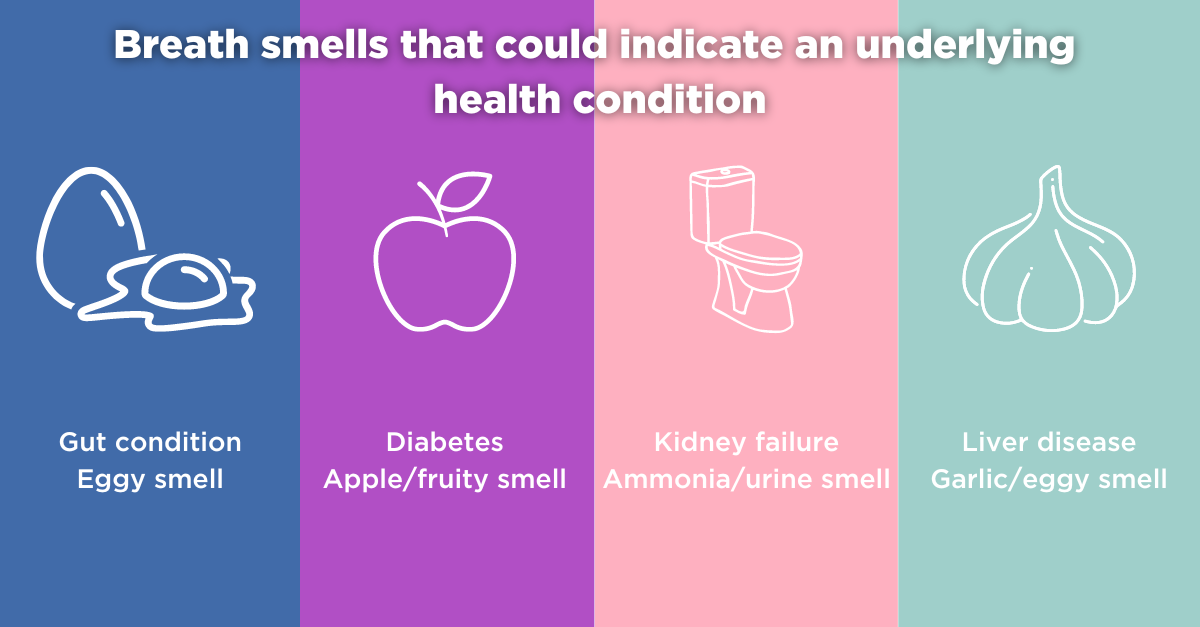Bad breath is rarely solely caused by gastrointestinal disorders but is often listed as a symptom in several conditions. Bad breath, or halitosis, is common and can usually be treated easily if the cause is from eating or drinking strong-smelling or spicy foods and drinks, tooth decay, crash dieting, or smoking. However, it could also be a sign of poor gut health. In this blog, we will explore the science behind bad breath, as well as what you can do to help alleviate your symptoms.
What do we know about bad breath?
Firstly, let’s travel back to ancient Greece, where the earliest indications that your exhaled breath could alert us to disease in the body were discovered. A physician called Hippocrates, one of the most outstanding figures in the history of medicine, discovered a connection between the distinctive breath odor and liver failure through his work on breath aroma and disease, which he referred to as fetor hepaticus. Although rudimentary in approach, this established two important principles:
- Exhaled breath contains compounds originating from deeper within the body than just the respiratory system.
- Changes in exhaled breath can alert to disease states within the body.
Back to the present day and one of our most recent blog posts, where we briefly discussed how ‘eggy breath’ can indicate elevated levels of hydrogen sulfide in the breath. So, what does this mean?
Hydrogen sulfide and bad breath.
Sulfur is a gas with a distinct smell and some of the bacteria in the gut break down compounds that contain sulfur and can generate hydrogen sulfide. Hydrogen sulfide smells like sulfur, eggy! It is normal to have some hydrogen sulfide in exhaled breath, but elevated levels could indicate several different inflammatory bowel diseases, such as Crohn’s disease, ulcerative colitis, and irritable bowel syndrome (IBS) (1).
Unfortunately, at present, in the UK it is not possible to routinely measure hydrogen sulfide via breath testing and caution should be taken if a service refers to a result of a gas that is not measured. There is ongoing research into the treatment of excess hydrogen sulfide, including building evidence that bismuth subsalicylate, better known in liquid form as pepto bismol, can reduce hydrogen sulfide levels in the breath(2). This is alongside probiotic treatments such as Lactobacillus and Streptococcus which are also thought to reduce levels of hydrogen sulfide produced in the gut (3). Experimenting with diet and foods to determine what can trigger your symptoms could also help.
Other causes of bad breath.
Other unusual breath smells that could indicate an underlying health concern are apple or fruity breath and diabetes, kidney failure may have breath that smells like ammonia or urine, and liver disease can make breath smell like garlic and rotten eggs (4).

But back to our gut health, halitosis could also indicate small intestinal bacterial overgrowth (SIBO) and is usually present alongside other symptoms such as bloating, abdominal pain, and flatulence. Research into why SIBO causes bad breath is limited but is thought to be linked to poor digestion of foods (5). There is good news in that SIBO can be diagnosed with a simple breath test. You can also discover more about SIBO treatments in this OMED blog.
If you are experiencing abdominal pain alongside bad breath, you may be recommended a H. pylori breath test. Helicobacter pylori (more commonly known as H. pylori) is a type of bacteria that causes infection in your stomach and can lead to inflammation in your digestive tract. It is thought that an H. pylori infection can sometimes be linked to higher levels of hydrogen sulfide in the breath, which will subsequently cause an unpleasant smell. We delved into more about H. pylori in this blog.
How can OMED Health help?
If you have persistent bad breath, especially alongside other symptoms, then do discuss this with your doctor. Remember, it is important to discuss with a healthcare professional before making any changes to your lifestyle or diet.
If you are interested in monitoring your gut health, the soon-to-be-launched OMED Health Breath Analyzer and App aims to help you learn more about what triggers your digestive discomfort. The device can collect breath samples alongside key lifestyle factors in the app to provide data to help you make informed decisions about your gut health.
References
- Singh SB, Lin HC. Hydrogen Sulfide in Physiology and Diseases of the Digestive Tract. Microorganisms. 2015 Nov 12;3(4):866–89. DOI: 10.3390/microorganisms3040866
- Suarez FL, Furne JK, Springfield J, Levitt MD. Bismuth subsalicylate markedly decreases hydrogen sulfide release in the human colon. Gastroenterology. 1998 May;114(5):923–9. DOI: 10.1016/s0016-5085(98)70311-7
- Karbalaei M, Keikha M, Kobyliak NM, Khatib Zadeh Z, Yousefi B, Eslami M. Alleviation of halitosis by use of probiotics and their protective mechanisms in the oral cavity. New Microbes New Infect. 2021 Apr 23;42:100887. DOI: 10.1016/j.nmni.2021.100887
- NIH News in Health [Internet]. 2018 [cited 2024 Feb 28]. Smelling Sickness. Available from: https://newsinhealth.nih.gov/2018/09/smelling-sickness
- Small intestinal bacterial overgrowth | UKF IMS [Internet]. [cited 2024 Feb 28]. Available from: https://ims.uniklinik-freiburg.de/en/health-library/gastroenterology/small-intestinal-bacterial-overgrowth.html

